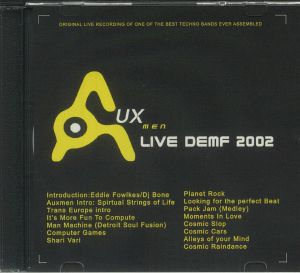Back catalogue: Techno (すべて)
Juno's full catalogue of Techno (すべて)
アルバム
Review: "It's like painting with button and sliders... Melting and dripping, seeping yourself liquid into the machinery." So said Darren Cunningham when discussing the creation of R.I.P, his long awaited follow up to Splazsh. It's a compelling image that works in practice too. R.I.P creates microcosmic sound worlds within each track: "Holy Water" for instance tumbles in on itself in a melange of shimmering sine wave droplets, while the pitch shifted waves of "Tree Of Knowledge" seem to inhale and exhale like a living being, crumpling inwards on itself to repeat the same motion ad infinitum. And although it uses much the same, occasionally abrasive sonic building blocks as Cunningham's been developing for many years, the pastoral tones of "Uriel's Black Harp" and the Alva Noto styles of "Jardin" make R.I.P a surprisingly graceful album. It may not be techno as many will know it, but Cunningham has never made techno in the traditional sense anyway - and it's clear on listening to R.I.P that he's only just beginning to realise the musical forms that have been swarming inside his brain for years.
… Read more in stock $10.37
in stock $18.50
Cat: BT 124CD. Rel: 31 Oct 24
Review: Black Truffle's tenth-anniversary reissue of Oren Ambarchi's Quixotism brings renewed attention to this monumental 2014 release. Originally recorded with collaborators across Europe, Japan, Australia, and the U.S., Quixotism unfolds as a single, long-form piece split into five sections. Anchored by Thomas Brinkmann's steady, double-time electronic percussion, the piece gradually evolves from orchestral depth and subtle piano motifs (courtesy of John Tilbury) to a striking polyrhythmic shuffle, culminating in the final passages with U-zhaan's masterful tabla. Throughout its journey, Ambarchi weaves guitar textures that shift from clipped, sparse tones to lush, reverberated layers, creating an expansive yet cohesive sonic landscape. The interplay of acoustic and electronic elementsiranging from the Icelandic Symphony Orchestra's grandeur to Crys Cole's intimate contact-mic texturesiguides the listener through an otherworldly audio experience. Influenced by Cologne techno, Eliane Radigue's long-form compositions, and the fluidity of improvisation, Quixotism shifts in subtle, dreamlike transitions. Remastered by Joe Talia, this edition offers a clearer perspective on the album's intricate sound design, reaffirming its relevance while pointing forward to Ambarchi's future works like Hubris and Hence.
… Read more in stock $14.02
ANNA / VARIOUS
Global Underground 46: ANNA - Lisbon (unmixed 2xCD)
Cat: 505419 7988073. Rel: 20 Jun 24
in stock $17.94
Review: Some 25 years after delivering his debut 12", Richard D James hasn't lost the ability to thrill or inspire. By his obtuse standards, the material that makes up the surprise Cheetah EP is actually rather laidback and melodious. "Cheetah2 (LD Spectrum)", for example, sounds like a slow house jam written by robots, while the even deeper "Cheetah7B" shuffles along in a metronomic fashion, seemingly oblivious to the increasingly aggressive World at large. Of course, those trademark skittish IDM rhythms are present and the Cornishman has thrown in a couple of hazy ambient cuts for good measure.
… Read morePlayed by: Lo Shea
in stock $11.49
Review: Back in 2002, the Detroit Electronic Musical Festival concluded with something rather special: a rare live performance from the Aux Men - an expanded and upgraded version of legendary Motor City electro outfit Aux88. This must-have CD presents that performance, complete with the original introduction from Eddie Fowlkes and DJ Bone, from start to finish. Full of spacey synth sounds, heavy beats, weighty bass, it's effectively a whirlwind trip through the history of both electro and Detroit's contribution to electronic music history. Thus, we get killer versions of 'Planet Rock', 'Shari-Vari', YMO's 'Computer Games', tons of Kraftwerk classics, a breathtaking interpretation of Art of Noise's 'Moments in Love' and rip-roaring takes on foundational tunes by Cybotron and Funkadelic..
… Read morePlayed by: Juno Recommends Experimental
in stock $8.96
Review: When Italian film director Luca Guadagnino commissioned long-term collaborators Trent Reznor and Atticus Ross to write and produce the soundtrack for Challengers, he had a clear idea in mind: music rooted in Berlin techno and 90s rave'. Reznor and Ross undoubtedly delivered, creating heavily electronic music that veers between guitar-laden nu-rave ('Yeah x10'), throbbing peak-time workouts (the Moroder-goes-to-Berghain flex of 'Challengers'), tech-tinged nu-disco ('The Signal', 'The Points That Matter'), pitched-black EBM-techno fusion ('Brutalizer') and acid-fired insanity ('Pull Over'). There are occasional nods to more classical movie soundtracks - see the choral versions of Benjamin Britten's 'New Year Prayer' - but for the most part it is a thrill-a-minute ride through deliciously heavy rhythms, basslines and electronics.
… Read more in stock $13.17

 USD
USD












